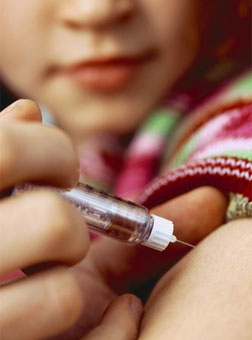 Don't worry, this article will only hurt a little.
Don't worry, this article will only hurt a little. Immunotherapy was developed based on the theory that postulates that increasing exposure to allergens can help one develop a tolerance to said allergens. A vaccine including small doses of allergens such as grasses or dust will be injected into your arm, and will trigger a minor immune response, and this process will be repeated weekly for months, even years, until signs of allergic reaction are reduced.
While the general effectiveness of immunotherapy has been demonstrated though empirical evidence, it does not work with the same rate of success for everyone. I had allergy shots for 5 years and never saw a reduction in symptoms, but a friend of mine saw marked improvement in a year and nearly all allergic response gone in a few more years.
If you have allergies, it would behoove you to speak to your allergy specialist about getting shots because right now it's the closest thing we have to an actual cure. While it will probably cause you some temporary discomfort, it does have a good success rate and could improve your life considerably.
Just remember to bring your favorite book or iPod to the office, because after having the solution administered, you generally need to be monitored for 15 or so minutes just to make sure you don't have a severe reaction. If you do have a reaction, the office or clinic will have emergency procedures in place to ensure that you will be okay.


